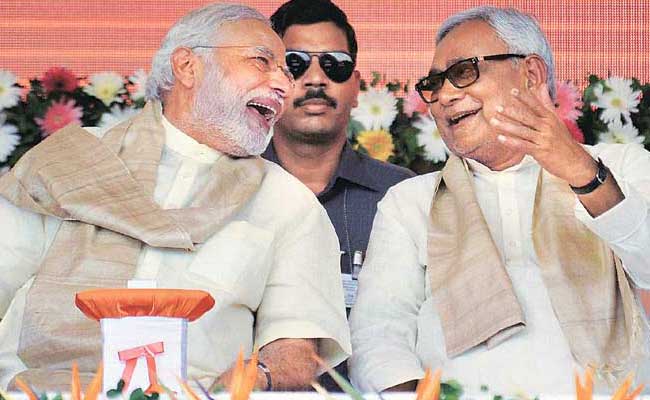But we all know that Nitish is not as naive as he is pretending to be. He has already started preparing for the 2019 parliamentary elections just like Modi did after winning the assembly elections for the third time in Gujarat. This is Nitish Kumar's third term with a massive majority; now, he wants to reach the highest level of Indian politics, and I see no reason why he should not.
He is a competent Chief Minister. He has great credentials as a politician with vast public and administrative experience. And I believe that he is secular in his beliefs. But I have a small submission: he should also take the blame for the grand success of RSS and Modi in national politics. Because it is the socialist politics of the past in which he played a big role that has made RSS what it is today.
It is ironical that his mentor and ideological guru Ram Manohar Lohia once said that the most important thing the socialist party lacked was patience. "It loses its patience whenever defeated. It gets easily disheartened and sets out to change its principles and programmes", Madhu Limaye quotes Lohia in his book, Birth of Non-Congressism. The same Lohia admired Christianity for its tenacity. He had said, "One wonders what strength a religion like Christianity had in its initial days when it was being persecuted from all sides for 300 years." After independence, the socialist block emerged as the biggest opposition force. This was the time when socialists had two of their brightest leaders in JP (Jayaprakash Narayan) and Lohia. But both could not agree on the political strategy to fight the Congress. JP was too enamoured of Nehru and Lohia was too critical. JP believed that Nehru needed the opposition's support for nation-building but Lohia was in no mood to spare Nehru. Finally, JP proceeded to retire from active politics. Lohia was left to lead the socialist movement.
Lohia was undoubtedly an original thinker and he gave a narrative which was later called "anti-Congressism" and discovered backward politics in the Indian context. But he was a man in a hurry and after every electoral defeat, he got even more impatient; finally he succumbed in early 60s to the temptation of forging an alliance with the RSS-led Jan Sangh, whom he always believed to be communal.
He won the parliamentary election from Farrukhabad in Uttar Pradesh in 1962 and canvassed for the Jan Sangh candidate in Jaunpur. Leaders like Madhu Limaye were very upset with the compromise made with the Jan Sangh. But Lohia prevailed, and finally in 1967, a grand alliance was forged with the Jansangh; for the first time, the Congress was defeated at a grand level in the states.

Prime Minister Narendra Modi with Bihar Chief Minister Nitish Kumar at a function in Patna (File photo)
VP Singh was not in the same league, but when history bestowed him with an opportunity he also squandered it with both hands. In 1989, when the nation was expecting him to chart a new course, he also walked the beaten path, fought elections on a common platform with the RSS/BJP, and formed the government with their support. Nitish Kumar was with VP Singh then. With the demise of the VP government in 1990, the BJP realized that the time had come for it to play the role of principle player instead of a subordinate one. In 1996, the BJP formed its first government at the centre. Nitish was a minister in Vajpayee's cabinet in its later incarnations. He didn't have the courage to resign when the Gujarat riots were engineered in 2002. He went on to form the government in 2005 with the BJP in Bihar; the alliance continued for another eight years. He was the Chief Minister and the BJP was his guardian angel.
Yes, I agree that he broke the relationship with the BJP in 2013 on the issue of Modi being projected as the Prime Ministerial candidate, but he should not forget that Modi is part of the RSS and its creation. In politics, ideology is supreme, not the individual. To call Modi communal and Vajpayee secular is an act of opportunism and a convoluted argument as self-justification. Both adhere to and swear by the RSS, and if the RSS is communal, then Vajpayee and Modi both are communal. Nitish has committed the same mistake as his socialist leaders did.
Now Nitish is powerful. He has been the Chief Minster for three terms, has a national profile. He does not need the RSS to succeed and the Congress is irrelevant. Nitish knows anti-BJP-ism has replaced anti-Congress-ism and he can be an axis for anti-RSS forces. So he is out to galvanize and bring all secular forces on one platform. It is an act of positioning for a future launch. He is shrewd enough to know that the slogan of RSS-mukt can act as a catalyst for future polarisation.
Unfortunately, despite his secular utterances, his courage of conviction does not carry weight. If he had the courage, he would not have allied with the RSS in the past. So questions will be asked - and who knows his past might haunt him in the future.
(Ashutosh joined the Aam Aadmi Party in January 2014.)
Disclaimer: The opinions expressed within this article are the personal opinions of the author. The facts and opinions appearing in the article do not reflect the views of NDTV and NDTV does not assume any responsibility or liability for the same.


